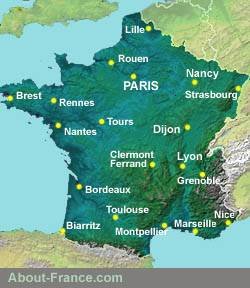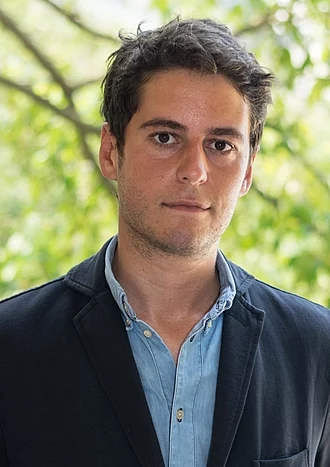
The Macron presidency
Challenges, surprises and the promise of a new way forward for France
- Explore France ►
- Essential pages
- Travel in France
- Where to go
- What to see and do
About-France.com
-
the connoisseur's guide to France
Emmanuel
Macron, the youngest French leader since Napoleon, promised a
new
French Renaissance – the rebirth of a nation that had
suffered from
thirty years of relative economic and social decline. It was a promise
that was never going to be easy to achieve.
Click here for an overview of political parties in France in the runup to the surprise 2024 general election in France
Back in 2014, no one outside family, friends and acquaintances, had heard of Emmanuel Macron. Today he is the President of France, and the youngest person to lead France since Napoleon Bonaparte. Like Napoleon, he has promised to make France great again – but that is where all resemblances end. Macron is no Napoleon; his plan to revive France was not military nor imperialistic; it was economic social and European, and for this reason far harder to achieve.
With Emmanuel Macron, French and international pundits have had to get used to expecting the unexpected. Even so, the calling of a snap general election in France for June/July 2024 caught even the most alert pundits off guard.
The fact that Macron, an outsider, won the presidential election in 2017 was just the first of many surprises.
The rule book of political orthodoxy in France was thrown out of the window, and those who expected that the Macron presidency would be more of the same, were surprised. So too have been those who imagined that Macron could work miracles.
For many, Macron's first big surprise after taking up office was to appoint a conservative politician as prime minister. Forty-six year old Edouard Philippe, previously mayor of Le Havre, had plenty of experience in politics, but no experience of government.
Yet this appointment of a moderate conservative to the post of Prime Minister did not surprise anyone who had understood the profound dislocation of traditional politics that Macron was engineering. Nor should anyone have been surprised by the appointment to the first Macron government of a mix of well-known moderates from several different traditional parties. The first Macron administration contained three senior figures from the Socialist Party, all centre-left moderates, together with three leading figures from the conservative Républicains party, notably Edouard Philippe and Bruno Lemaire, along with François Bayrou from the centrist Modem party (Mouvement Democratique), and popular TV environmentalist Nicolas Hulot, as well as new faces largely unknown to the French public.
In brief, the composition of the first Macron government should have surprised nobody, as it reflected exactly what Macron's mould-busting movement "En Marche" - later called "La République en Marche, or LREM) was all about. About breaking out of the classic left-right division that had paralysed French politics and reined back the French economy for the best part of thirty years; about forming a government of the centre that would not be the prisoner of militant hard-liners of the left or of the right because it would not depend on the support of hard-liners for its survival.
At first all went to plan. LREM on their own had an absolute majority in the Assemblée Nationale, the French parliament. With the help of their Modem partners, they had 350 out of the 577 seats; and taking account of a few more "sympathetic" or "Macron-compatible" députés from other parties, against whom LREM did not field a candidate, such as the single surviving green MP Eric Alauzet and former Socialist prime minister Manuel Valls, they had even more.
Macron had almost five years to get the French economy back on the rails, bring down France's endemic unemployment, and show, through falling unemployment and rising living standards, that France was on the road to recovery. But he also had the unexpected Yellow Vest movement and the Covid crisis to deal with.
Though Macron's political background was as an adviser to Socialist president François Hollande, and as minister of the economy in the Hollande government, Macron is no collectivist socialist. It is telling that he appointed figures from the Republican party to the key economic jobs in his first administration. Macron is pro-business, pro-innovation and against the legislative red-tape that can complicate the life of French businesses.
However even though LREM had a comfortable majority in parliment, they also had several vocal and wounded oppositions – on the left, and on the right. The biggest opposition party, the Républicains, was quick to challenge Macron on any economic reforms that they feel do not go far enough; and the same reforms aroused strident opposition from left-wing opposition groups, La France Insoumise, piloted by Jean-Luc Mélenchon, and from Marine Le Pen's far right National Rally (Rassemblement national).
Change in France is painful for some, if not for all, but Emmanuel Macron was elected on a ticket of change with a commitment to put France back on the road to strength and prosperity, and to do so firmly within the framework of the European Union. At the head of a movement he himself created, with no paymasters to report back to, no militants to satisfy other than his own supporters, and no partners to rein him in, Macron seemed to have an open road to enact the reforms that are vital if France is to get back on the road to prosperity, such as the essential reform of the French retirement system. And as long as he had the parliamentary majority to carry out his programme, he did so with confidence, in spite of the howls of protest from vested interests that have derailed so many vitally needed reforms in France over the past thirty years.
Not giving up in spite of adversity has been the hallmark of the second Macron presidency, that began in 2022, in the wake of the turmoil created by Covid. Macron was reelected president in another runoff against the far-right candidate Marine Le Pen, though not as comfortably as in the past. However his LREM party, renamed Renaissance, failed to achieve an absolute majority in the National Assembly, leaving the new government dependent on ad-hoc alliances for different pieces of legislation, or else on the much reviled Article 49.2 of the French constitution, which allows laws to be passed without a vote.
In spite of appointing first a left-winger, Elizabeth Borne, and subsequently a popular up-and-coming centrist, Gabriel Attal, to the post of Prime Minister, Macron's second administration has been under attack since day 1, particularly from the far right who have tabled more than one unsuccessful vote of no confidence against the government. However, it was the constant sniping from the far right and from the far left that convinced Macron, in the wake of his party's very poor showing in the 2024 European elections, to call a snap general election.
Whatever the outcome of the election, Macron will remain President of France until 2027, most likely presiding over a government either of the centre left or of the far right. It has been suggested that Macron will not be gutted if he has to appoint Jordan Bardella, of the Rassemblement National, as his next prime minister; this will give the far right just enough time in power, three years, to show that it is no better at solving the problems of ordinary French voters than are the mainstream political parties.. The example of the UK's short experiment of a government applying the policies of the far right, the 41-day government of Liz Truss, suggest that a Bardella government, if it comes to that, will not solve many of the everyday problems faced by the people in France who have voted for him.



Gabriel Attal, appointed French Prime Minister in 2024
Photos public domain or creative commons licenced photos


A choice of French
stores & brands that deliver abroad
About-France.com
is an independent website that does not track users and does not show
any
personalised advertising, Affiliate links to selected relevant external
partner websites may lead to paymet of a small commission on
sales or bookings generated on
these sites.
